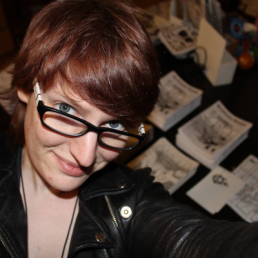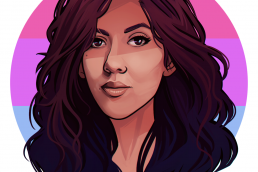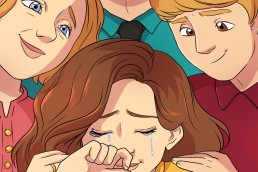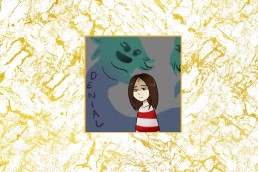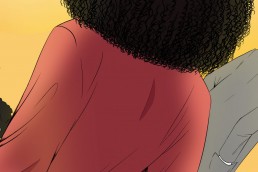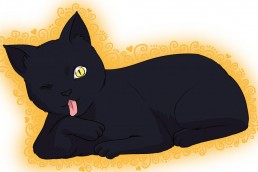by Ana Hine
Art: Ida Henrich
I was recently diagnosed with borderline personality disorder and now I’ve realised I don’t really know how to navigate interpersonal relationships.
I try to talk to friends and family about my emotional struggles, but some of the things I’ve been through – being sexually assaulted, hospitalisations – can be hard for people to hear. I’ve learnt that if I’m having a panic attack it’s better for me not to call someone, because very few people can actually handle being around me when I’m extremely ill. I threaten self-harm and suicide, don’t bandage the wounds I make on my skin, talk as if I’m the only person to ever experience suffering. Afterwards, I feel awful for my behaviour and for putting my friends, family, or partners through what must be a very scary experience for them.
The main thing I’m trying to work on at the moment is taking responsibility for my actions and behaviour and trying to be a nicer person to be around.
The main thing I’m trying to work on at the moment is taking responsibility for my actions and behaviour and trying to be a nicer person to be around.
It’s difficult though. Borderline Personality Disorder is characterised by extreme reactions to break-ups and perceived abandonment. I still get flashbacks to the messages I sent to an ex-boyfriend where I pleaded with him to come back after he left me. I must have sent at least a thousand text messages over a three-month period, stalked him online and eventually ended up outside his parents’ house at the other end of the country. They called the police and I was taken to a psychiatric hospital and sectioned. The only consolation was that he wasn’t at home, having moved in with a friend. I still don’t know his current address, and don’t want to. I can’t begin to imagine how frightening the experience must have been for him.
After I got out of hospital I contacted helplines to try to work through the need within me to reach out to him, and to see how I could go forward knowing I’d behaved in such a way towards a partner. I took part in online talking therapy focused on female perpetrators of domestic abuse, but was repeatedly told my case was a ‘grey area’ because of how ill I’d been at the time of the harassment. Even so, I’m terrified of putting anyone through something similar.
A few months ago I was chatting to a guy on a dating site when he posted a new photograph of himself. Unfortunately, the picture highlighted the similarities between him and my ex, and I found myself paralysed with fear. I couldn’t continue chatting, because I was suddenly convinced that it would be better for this guy not to know me at all.
I often wonder if my ex wishes he never met me, and I trawl through internet forums and articles about ‘borderline ex girlfriends’ that have ruined their partners’ lives. Some academic studies suggest that borderline might be connected to PTSD, implying that dealing with our trauma could help us become better and safer people to be around. I don’t know, though.
Sometimes I wonder if some of my self-loathing and insecurity comes from internalised homophobia. I’ve had a few girlfriends and had a lot of casual dates and hookups with women, but I think some of my mental health issues stem from not being entirely comfortable with my sexuality.
Sometimes I wonder if some of my self-loathing and insecurity comes from internalised homophobia. I’ve had a few girlfriends and had a lot of casual dates and hookups with women, but I think some of my mental health issues stem from not being entirely comfortable with my sexuality. I find it hard to date women in my hometown and my mother is very homophobic, which means I worry about what it would be like to have a girlfriend here. I want my mum to be accepting of any partner I have – as long as they’re nice and we treat each other well. Maybe things broke down so badly because of deep-seated sexual frustration on my part, and if that’s the case I need to examine whether dating men is even a good idea in the long-term or whether I should be concentrating on accepting the queer parts of myself a little better.
Whoever I end up with next, I hope I don’t put them through the same sort of hell my ex experienced. I work hard every day to not be that person; I take my meds, make sure I get enough sleep, and watch out for triggers. Some days I even make it through without any new scars or suicidal ideation, but until that is the situation every day I want to be honest with myself about whether I should be dating. Although the dates I’ve been on recently with women have been fine I wonder if I should just concentrate on being healthy and stable on my own. Mainly, I wish there was more support for BPD sufferers. I don’t want to be a risk to anyone.
Ana Hine
Ana Hine is a former reporter who now spends her time doing activism, writing poetry, and making zines. She has written for The Skinny, DIVA, i-D, and been written about in The Scotsman, The Daily Mail, and numerous undergraduate dissertations.
She likes Earl Grey tea and second-hand books. You can subscribe to her feminist arts zine Artificial Womb on Patreon at www.patreon.com/artificialwomb

